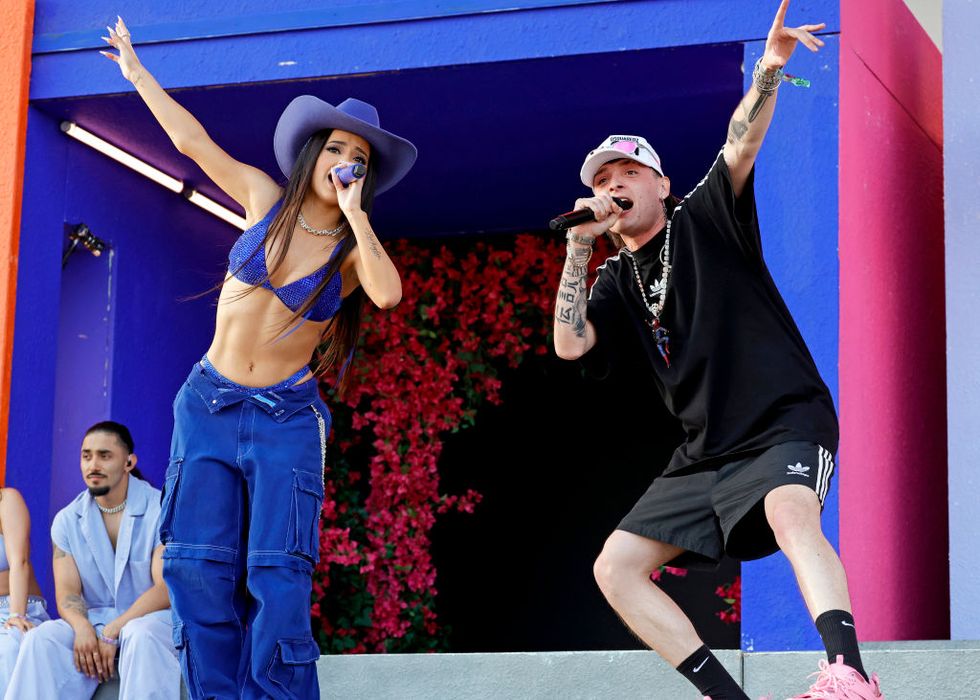Peso Pluma isn’t getting in on a trend, he’s plotting a takeover.
At just 24 years old, the singer from Jalisco has already made history, becoming the first Mexican artist to crack the Top 10 of the Billboard Hot 100 alongside Eslabon Armado with “Ella Baila Sola,” and outranking heavy-hitters like Drake and Harry Styles on Spotify’s Global Artist chart. These milestones haven’t just lifted Pluma to new heights, but taken the regional Mexican music scene along with him.
“Going global was always the main priority,” says Pluma. “I wanted my music to be heard all over the world, and I think that’s happening little by little.”
More From Harper's BAZAAR

Pluma only has a few minutes before he needs to rush out of his New Orleans hotel room to make it to soundcheck. Sporting a black backwards cap and a simple white Burberry tee, his laid-back energy is a world away from what you might expect of a major star a few hours away from his next arena show. But that’s just how Pluma is—not cocky, but confident that things will work out; that this is exactly where he’s supposed to be.
From an outside perspective, though, it’s hard to overstate just how uncharted these waters are for someone like him. While Latin music has been in the midst of a decade-plus-long “boom,” it’s largely been led by reggaeton and Latin trap artists, most of whom hail from Puerto Rico and the Dominican Republic. Pluma’s corridos are something else entirely.
Even within the world of Mexican music, corridos have often been seen as outdated—the kind of music your grandpa might put on the radio, not the kind you would go dance to at a club. It’s a narrative genre, one driven by stories of romance, heartbreak, and, in the case of the controversial “narcocorridos,” the exploits of drug traffickers. The subjects may vary, but for years, the guitar-driven instrumentation stayed the same. Recently, though, artists like Natanael Cano, one of Pluma’s influences and a collaborator on his most recent album, have brought corridos into modern day with corridos tumbados—an offshoot of the genre that keeps the same lyric-heavy approach, but also freshens it up with Latin trap and hip-hop sounds, or layers instruments from other Mexican genres, bringing in tubas, trombones, and tololoches.
Having grown up listening to everything from Drake to Luis R Conriquez, Pluma took to the genre naturally. Self-taught on the guitar, he began writing his first songs as a teenager, teaming up with his cousin (who he still performs with today) to write together. “I used it as therapy,” he says. “Writing songs was a way to talk about the feelings I kept guarded, that I couldn’t talk to other people about.”
“Peso Pluma” started off as a name for his whole band, a reference to the THC pens (“plumas”) that they liked to smoke. The moniker, which literally translates to “featherweight,” was solidified after an encounter with former featherweight boxer Marco Antonio Barrera, and the singer, who was born Hassan Emilio Kabanda Laija, went on to adopt it as his own stage name.
With his bluntly chopped bangs, mullet, and subdued streetwear style, Pluma’s look is a marked departure from the ranchero aesthetic that remains popular with other Mexican and Tejano acts. Where those artists might splurge on a high-end cowboy hat or a flashy belt buckle, Pluma is more likely to accessorize a black t-shirt with a $500,000 Spider-Man chain. The singer’s fashion sensibilities, like his music, aren’t traditional; they’re current, sometimes irreverent, and clearly rooted in the tastes of the younger generation. Pluma might not look like a likely poster child for regional Mexican music. But when he opens his mouth to sing, it’s clear why he’s gotten this far. Slightly nasal and gritty, his voice is capable of conveying emotion in a way that’s hard to ignore.
“I guess I found out that my voice was specially made for regional music,” he says. “It’s just my roots, it’s where I’m from.” It’s something Pluma takes pride in, knowing that his success isn’t just about him, but about uplifting the community he comes from and the culture that made him. “I want to show people where I’m from, how we think, how we live, and what we listen to. It’s a genre that no matter what country you’re from, it’ll make you dance. It’s original, it’s authentic, and you won’t hear it anywhere else.”
Holding firm to the traditional genre has worked well for the singer. He performed on The Tonight Show Starring Jimmy Fallon in April—again making history as the first regional Mexican act to do so— just a few weeks after taking the stage with Becky G at Coachella, where he was met with wild cheers. “Before, you wouldn’t hear a corrido even in the most popular parts of Mexico,” he says. “Now, to be able to say that all kinds of people listen to corridos, that’s what we wanted to do—to unite people regardless of social status, genre, anything.”
Ahead of his first U.S. tour, Pluma has just released his third album, Génesis, a name that denotes how the singer sees the current chapter of his life. Across 14 tracks, he makes a case for himself as the future of música Mexicana, with help from tumbado artists like Cano and Junior H, Sinaloan singer/accordionist Edgardo Nuñez, Norteño act Dareyes de la Sierra. The singer even enlisted Puerto Rican rapper and Latin trap star Eladio Carrión for “77,” a genre-bending banger that shouldn’t work, but absolutely does.
To be clear, there have been plenty of regional Mexican acts who have found success and amassed fervent, loyal fan bases on both sides of the border for decades, but Pluma’s ability to connect with younger generations while still holding onto the classic elements of his genre has taken him from a regional phenomenon to a global star. “This is the beginning of a new era, not just for us as a band, or me as an artist, but for this whole industry,” he explains. “The whole genre is going global, and I’m so grateful that this new era in Mexican music has been so well accepted and that we get to be the protagonists of this moment, that we get to be the ones who take it international and to a whole other level. We’re aware of that.”
A week after the release of Génesis, he now occupies half of the top ten spots in Billboard’s Hot Latin Songs chart. “It was a dream that I knew that I knew could come true,” he says. “We've worked really hard to make this happen, we’ve shattered a lot of expectations from people who thought that Mexican music couldn’t do it, that we were half-assing it, that the music didn’t have the potential to do it, and I think we’ve quieted a lot of voices and raised the Mexican flag up high.”
It’s been a lot to take in, and while he’s grateful for the whirlwind year he’s been having, it’s also been one that’s kept him away from home, and away from his family. Pluma knows it’s necessary, though. Oddly, he likes the pressure. Knowing more people are watching him, that people in Mexico are looking to him as a representative, while everyone else tries to suss him out—it creates an element of excitement that he needs to keep focused.
“Everyone wants to do what I’m doing right now,” he says. “That’s a sign that we’re doing things right. I think that’s one of the things people like about me. I’m not copying anyone, I’m just me, I’m not pretending to be anyone else. And at the end of the day, I get even with a pen and paper.”















